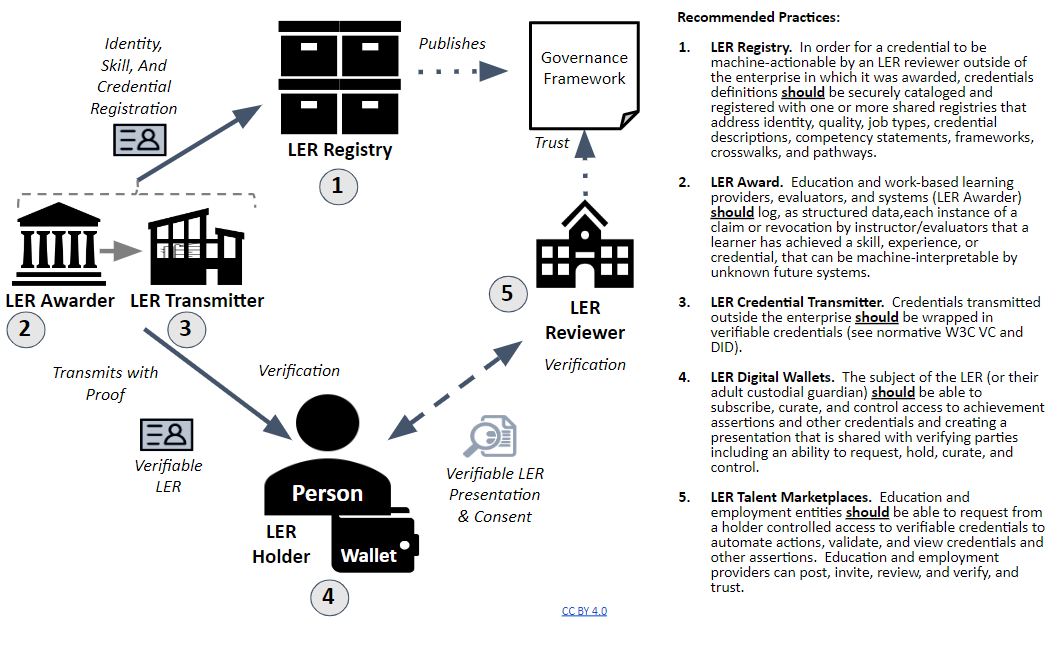Sponsoring Committee: IEEE Computer Society/Learning Technology Standards Committee (C/LTSC)
Title: IEEE Std 1484.2-2024 LER Ecosystem Standard
Published: 23 August 2024
Official Standard Available for Purchase: IEEE Standards Store
Scope: IEEE P1484.2 Recommended Practices for Learning and Employment Record (LER) Ecosystems are intended to help system architects, and engineers design and deploy systems that leverage shared standards and technologies to support ecosystem-scale issuing, holding, and presenting verifiable credentials for education, skills-based hiring, and career advancement.
The Institute of Electrical and Electronics Engineers (IEEE) traces its founding to 1884 and the American Institute of Electrical Engineers. As of 2018, it is the world’s largest association of technical professionals with more than 423,000 members in over 160 countries around the world. Its objectives are the educational and technical advancement of electrical and electronic engineering, telecommunications, computer engineering, and similar disciplines. IEEE standards such as 802.11 set global network technical standards at the scale of the Internet.
After four years of work, on May 20, 2024, the P1484.2 Recommended Practices for Learning and Employment Record (LER) Ecosystems was approved as a standard, IEEE Std 1484.2-2024. It is currently in the publishing phase, with a tentative publication by mid-summer. The IEEE-published standard can be directly referenced in government legislation, regulations, procurements, and agreements.
IEEE Std 1484.2-2024 sets a common global standard framework for LER ecosystems with five recommended components:
The IEEE 1484.2-2024 standard includes normative references to W3C VC and DID and references a robust, open-source set of informative resources including:
- standards like CEDS, CASE, CTDL, A4L, Ed-Fi EPDM, HR Open LER-RS, and CLR
- aligned open-source efforts including Credential Registry, OpenSALT, Open Credential Publisher (OCP), and LEF LearnCloud
The following definitions clarify how some key terms are used in this document. It is recognized that different communities of practice and different linguistic communities use terms in diverse ways. The definitions here are not intended to suggest that any particular use of other terms outside this document is correct, incorrect, superior, or inferior.
Learning and Employment Record (LER): An open standards-based, computationally-actionable, digital record of an individual’s formal and informal learning and employment that is constructed as a W3C Verifiable Credential (or equivalent) that can be combined with other digital records useful in supporting an individual’s education, employment, and supportive services.
LER Awarder: A formal education, informal education or work-based learning provider, or an evaluator or credentialing organization, that asserts one or more claims about a person achieving a competency at a performance level.
LER Digital Wallet: A software application or other technology used by the LER Holder to subscribe, curate, and control access to achievement assertions and other credentials by creating a presentation that is shared with LER Reviewers.
LER Holder: The natural person who is the subject of the awarded LER (or their legal guardian or authorized agent) and has rights to curate and control access to the LER data beyond the educational and employment purposes of the issuing entity, the LER Awarder.
LER Presentation and Consent: The process an LER Holder uses to control access to LERs.
LER Registry: Shared services that provide trusted governance of, and access to, catalogs of LER Awarders description and LER specifications (e.g., credential type, credential descriptions, and competencies) to verify the LER Awarder and the details of the LER being awarded.
LER Reviewer: An employer, education provider, training provider, career counselor, service provider, or other organization or person who reviews an LER for the purpose of informing hiring, staffing, admission, placement, financial aid, or similar decisions.
LER Transmitter: A service provider that serves as a proxy for/or is the LER Awarder that prepares the LER as a Verifiable Credential and provides the LER to the LER Holder.
LER Trust: The ability of the LER Reviewer to “trust” meaning: (1) the LER has not been altered; (2) the LER was awarded by the entity indicated; (3) the LER meaning maps to semantics the LER Reviewer understands; and (4) a specific LER verifiable credential has not been revoked or expired.
LER Verification: The evaluation of whether a verifiable credential or verifiable presentation is an authentic and timely statement of the LER Awarder and LER Holder, respectively. This includes checking that: (1) the credential (or presentation) conforms to the specification; (2) the proof method is satisfied; and, if present, (3) the status check succeeds (W3C VC DM).
LER Talent Marketplace: A skills-based talent marketplace which operates in the LER Ecosystem to match an LER Holder’s presented LER data to LER Reviewer job requirements. A transformation of enterprise human capital management towards an objective measurement of competencies which is transportable as LERs and controlled by the LER Holder. LER Talent Marketplaces are organized around specific industries, professions or occupations having shared competencies, skills, and job requirements.



